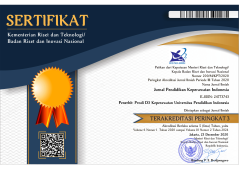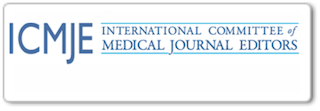The Effectiveness of Peer-led Technology on HIV Prevention Among Adolescent in Bandung
Abstract
ABSTRACT
The prevalence of HIV infection in aged 15-19 years old was increased significantly every year. Adolescent is a high-risk groups for HIV infection due to high chance to try something new and having big influenced by their peer in school. There is limited intervention utilizing technology conducted in Indonesia to reduce the risk of HIV among adolescents. This study aimed to test the effectiveness of peer-led technology on knowledge and attitude towards HIV prevention among adolescent in Bandung. This research was a queasy experiment with one group conducted in a one of private senior high school in Indonesia from April to August 2018. The sample in this study was a student in one of private high school in Bandung. The inclusion criteria in this study were high school students in grade 1, 2; three sample technique used simple random sampling. The Bahasa version of knowledge and attitude towards HIV prevention were used to measure the outcome. Paired t test used to test the mean sore of knowledge and attitude the intervention before and after. A total of 28 senior high school students agreed to join in this study. This study found that peer-led technology was useful to improve the knowledge and attitudes of high school students towards HIV prevention, mainly through sexual transmission (p-value <0.001, with a mean difference between pre-test and post-test, was 5.2 for knowledge and 3.19 for attitude). In conclusion, utilizing technology to provide health education in adolescent effectively to improve knowledge and attitude towards HIV prevention.
ABSTRAK
Prevalensi HIV infeksi pada umur 15-19 tahun meningkat secara signifikan setiap tahun. Remaja adalah kelompok berisiko tinggi untuk infeksi HIV, pada masa ini mereka senang mencoba sesuatu yang baru dan juga faktor tingginya pengaruh teman sebaya di sekolah. Masih sedikit intervensi pencegahan HIV yang memanfaatkan teknologi untuk mengurangi risiko HIV kalangan remaja di Indonesia. Penelitian ini bertujuan untuk menguji efektivitas peer lead teknologi terhadap pengetahuan dan sikap dalam pencegahan HIV di antara remaja di Bandung. Penelitian ini merupakan kuasi eksperimen pada satu kelompok perlakuan yang dilakukan di salah satu SMA swasta di Indonesia dari bulan April hingga Agustus 2018. Kriteria inklusi dalam studi ini adalah siswa SMA kelas 1 dan 2. Teknik pengambilan sample dengan menggunakan simple random sampling. Instrumen versi bahasa indonesia digunakan sebagai instrumen untuk mengukur pengetahuan dan sikap terhadap pencegahan HIV. Analisa data menggunakan paired T test untuk mebandingkan hasil sebelum dan sesudah intervensi. Total sejumlah 28 siswa SMA setuju untuk bergabung dalam studi ini. Studi ini menemukan bahwa peer lead technology berguna untuk meningkatkan pengetahuan dan sikap siswa SMA terhadap pencegahan HIV, terutama melalui transmisi seksual (p-nilai < 0.001, dengan perbedaan yang berarti antara sebelum dan sesudah intervensi adalah 5.2 untuk pengetahuan dan 3.19 untuk sikap). Kesimpulannya, pemanfaatan teknologi dalam pendidikan kesehatan pada remaja terbukti efektif dalam meningkatkan pengetahuan dan sikap terhadap pencegahan HIV.
Keywords
Full Text:
PDFReferences
Bandura. (1997). A Self-efficacy: Toward a unifying theory of behavioral change. Psychol Rev; 84: 191 – 215.
Fisher J D, Fisher W A. (1992). Changing AIDS-risk behavior. Psychol Bull; 111: 455 – 74
Kementrian Kesehatan RI. (2016). Profil Kesehatan Indonesia tahun 2015. Jakarta : Kementrian Kesehatan RI.
Kim C R, Free C. (2008). Recent evaluations of the peer-led approach in adolescent sexual health education: A systematic review. Perspect Sex Reprod Health; 40: 144 – 51.
Massye, P. (2013). School-based HIV prevention in Dakar, Senegal: Findings from a peer-led program. Int’l. Quarterly of Community Health Education, Vol. 33(2) 129-141.
Medley A, Kennedy C, O’ Reilly K, Sweat M. (2009) Effectiveness of peer education interventions for HIV prevention in developing countries: A systematic review and Meta analysis. AIDS Educ Prev; 21: 181 – 206.
Morales. (2014). the short-term impact of peers as co-facilitators of an HIV prevention programme for adolescents: A cluster randomised controlled trial. The European Journal of Contraception and Reproductive Health Care, 2014; 19: 379–391.
Simoni JM, Nelson KM, Franks JC, et al. (2011) Are peer interventions for HIV effi cacious? A systematic review. AIDS Behav; 15: 1589 – 95.
Purnama, H. Darmawati, Irma, Lindayani,L. (2018). The Effectiveness of Skills for Adolescents with Healthy Sexuality (SAHS) Program on Reducing the Risk of HIV Transmission among Adolescents. INJECT.Oct.2018
Tempo.conasional. (2015, Desember 31). Retrieved from tempo.cobandung: http://nasional.tempo.co/read/news/2015/12/31/058732095/ratusan-remaja-bandung-lakukan-hubungan-seks-berisiko
Tolli M. (2012). Effectiveness of peer education interventions for HIV prevention, adolescent pregnancy prevention and sexual health promotion for young people: A systematic review of European studies. Health Educ Res ; 27 : 904 – 13.
Ugarte. (2013). Assessing knowledge, attitudes, and behaviors related to HIV and AIDS in Nicaragua: A community-level perspective. Sexual & Reproductive Healthcare: 4 (2013) 37–44
UNAIDS. (2016). Global Report: UNAIDS report on the global AIDS epidemic. Retrieved from:http://www.unaids.org/sites/default/files/media_asset/UNAIDS_Global_Report_2016_en_1.pdf . Diakses pada 10 Juli 2016.
Yusuf, LN, S. (2015). Psikologi Perkembangan Anak dan Remaja. Bandung: PT Remaja Rosdakarya.
Wanda. (2015). Presentas pemakaian kondom pada transaksi seksual terakhir pada WPS di Saritem Bandung. Prosiding pendidikan dokter. ISSN 2460-657X.
Wang. (2014). Do community-based strategies reduce HIV risk among people who inject drugs in China? A quasi-experimental study in Yunnan and Guangxi provinces. Harm Reduction Journal , 11:15
DOI: https://doi.org/10.17509/jpki.v4i2.13629
Refbacks
- There are currently no refbacks.
Jurnal Pendidikan Keperawatan Indonesia(JPKI) published by Indonesia University of Education. JPKI is licensed under a Creative Commons Attribution-ShareAlike 4.0 International License.
Office :
Nursing Department. FPOK UPI.
229, Dr. Setiabudhi Street. Bandung 40154
West Java , Indonesia
E-mail : jpki@upi.edu

_.png)
_.png)
_.png)











